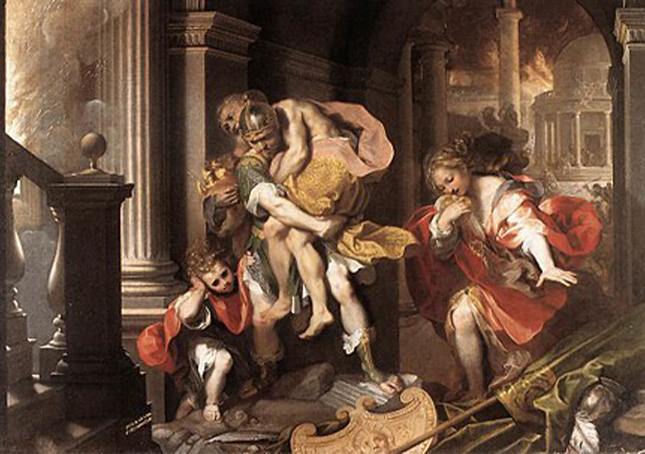Aeneid

The Aeneid (/ɪˈniːɪd/ ih-NEE-id; Latin: Aenē̆is [ae̯ˈne(ː)ɪs]) is a Latin epic poem, written by Virgil between 29 and 19 BC,[1] that tells the legendary story of Aeneas, a Trojan who travelled to Italy, where he became the ancestor of the Romans.
It comprises 9,896 lines in dactylic hexameter.[2] The first six of the poem’s twelve books tell the story of Aeneas’s wanderings from Troy to Italy, and the poem’s second half tells of the Trojans’ ultimately victorious war upon the Latins, under whose name Aeneas and his Trojan followers are destined to be subsumed.
The hero Aeneas was already known to Greco-Roman legend and myth, having been a character in the Iliad. Virgil took the disconnected tales of Aeneas’s wanderings, his vague association with the foundation of Rome and his description as a personage of no fixed characteristics other than a scrupulous pietas, and fashioned the Aeneid into a compelling founding myth or national epic that tied Rome to the legends of Troy, explained the Punic Wars, glorified traditional Roman virtues, and legitimized the Julio-Claudian dynasty as descendants of the founders, heroes, and gods of Rome and Troy.
The Aeneid is widely regarded as Virgil’s masterpiece and one of the greatest works of Latin literature.
The Aeneid can be divided into halves based on the disparate subject matter of Books 1–6 (Aeneas’s journey to Latium in Italy) and Books 7–12 (the war in Latium). These two-halves are commonly regarded as reflecting Virgil’s ambition to rival Homer by treating both the Odyssey’s wandering theme and the Iliad’s warfare themes.[7] This is, however, a rough correspondence, the limitations of which should be borne in mind.
Virgil begins his poem with a statement of his theme (Arma virumque cano …, “Of arms and the man I sing …”) and an invocation to the Muse, falling some seven lines after the poem’s inception (Musa, mihi causas memora …, “O Muse, recount to me the causes …”). He then explains the reason for the principal conflict in the story: the resentment held by the goddess Juno against the Trojan people. This is consistent with her role throughout the Homeric epics.
